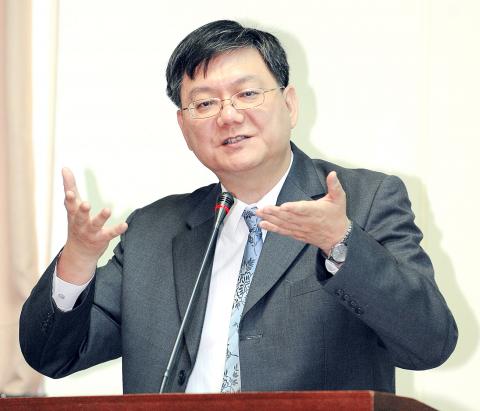Taiwan and Vietnam are negotiating a new bilateral investment agreement (BIA) aimed at protecting Vietnam-based Taiwanese companies, including those registered with the local government, but that do business worldwide, a government official said yesterday.
However, because it remains unclear when the negotiations can be concluded, only Taiwanese companies doing business in Vietnam can ask for compensation from the Vietnamese government under the existing BIA for losses resulting from recent anti-China riots, Vice Minister of Economic Affairs Woody Duh (杜紫軍) said.
“We hope the Vietnamese government can also recognize Taiwanese companies that registered as businesses in Vietnam, but trade internationally, so they can be protected under the Taiwan-Vietnam BIA,” Duh told the legislature’s Economics Committee.

Photo: Chen Chih-chu, Taipei Times
Earlier last week, violence broke out across Vietnam as local residents demonstrated against China’s deployment of an oil rig in waters claimed by the country. Taiwanese firms, such as Cheng Shin Rubber Industry Co (正新橡膠) and Formosa Plastics Group (台塑集團), also suffered from the attacks.
Chinese Nationalist Party (KMT) legislators Huang Chao-shun (黃昭順) and Lee Ching-hua (李慶華) demanded that the government act aggressively to protect Vietnam-based Taiwanese companies. They even suggested the Ministry of Economic Affairs persuade the attacked firms to move back to Taiwan.
In response, Duh said the current version of Taiwan-Vietnam BIA, which was signed in 1993, ensures governments compensate foreign companies through tax exemptions, low interest rate loans and delayed mortgage payments.
The two countries started talks about overhauling the BIA more than a year ago because the treaty was found to be flawed in comparison with BIAs of other countries that guarantee protection of offshore businesses, as well as government-to-government compensation, Duh said. While the ministry is revamping the BIA with its Vietnamese counterpart, Taiwanese businesses should collect evidence of attacks by Vietnamese protesters against their properties for future compensation applications, he added.
As of Sunday, 224 Taiwanese companies’ plants were reported to have been damaged during the riots, with 18 firebombed and five completely destroyed, according to ministry statistics.
About 1,100 Taiwanese companies have not yet resumed their operations due to security concerns, with most from the shoe, clothing, furniture, bicycle and electronics manufacturing industries, the ministry said.
Vice Minister of Economic Affairs Shen Jong-chin (沈榮津) is to lead a task force on a trip to Vietnam tomorrow.
Duh said the ministry will conclude assessing the losses to Taiwanese firms by Friday, when Shen is scheduled to meet Vietnamese government officials.

INVESTIGATION: The case is the latest instance of a DPP figure being implicated in an espionage network accused of allegedly leaking information to Chinese intelligence Democratic Progressive Party (DPP) member Ho Jen-chieh (何仁傑) was detained and held incommunicado yesterday on suspicion of spying for China during his tenure as assistant to then-minister of foreign affairs Joseph Wu (吳釗燮). The Taipei District Prosecutors’ Office said Ho was implicated during its investigation into alleged spying activities by former Presidential Office consultant Wu Shang-yu (吳尚雨). Prosecutors said there is reason to believe Ho breached the National Security Act (國家安全法) by leaking classified Ministry of Foreign Affairs information to Chinese intelligence. Following interrogation, prosecutors petitioned the Taipei District Court to detain Ho, citing concerns over potential collusion or tampering of evidence. The

‘FORM OF PROTEST’: The German Institute Taipei said it was ‘shocked’ to see Nazi symbolism used in connection with political aims as it condemned the incident Sung Chien-liang (宋建樑), who led efforts to recall Democratic Progressive Party (DPP) Legislator Lee Kun-cheng (李坤城), was released on bail of NT$80,000 yesterday amid an outcry over a Nazi armband he wore to questioning the night before. Sung arrived at the New Taipei City District Prosecutors’ Office for questioning in a recall petition forgery case on Tuesday night wearing a red armband bearing a swastika, carrying a copy of Adolf Hitler’s Mein Kampf and giving a Nazi salute. Sung left the building at 1:15am without the armband and apparently covering the book with a coat. This is a serious international scandal and Chinese

Seventy percent of middle and elementary schools now conduct English classes entirely in English, the Ministry of Education said, as it encourages schools nationwide to adopt this practice Minister of Education (MOE) Cheng Ying-yao (鄭英耀) is scheduled to present a report on the government’s bilingual education policy to the Legislative Yuan’s Education and Culture Committee today. The report would outline strategies aimed at expanding access to education, reducing regional disparities and improving talent cultivation. Implementation of bilingual education policies has varied across local governments, occasionally drawing public criticism. For example, some schools have required teachers of non-English subjects to pass English proficiency

TRADE: The premier pledged safeguards on ‘Made in Taiwan’ labeling, anti-dumping measures and stricter export controls to strengthen its position in trade talks Products labeled “made in Taiwan” must be genuinely made in Taiwan, Premier Cho Jung-tai (卓榮泰) said yesterday, vowing to enforce strict safeguards against “origin laundering” and initiate anti-dumping investigations to prevent China dumping its products in Taiwan. Cho made the remarks in a discussion session with representatives from industries in Kaohsiung. In response to the US government’s recent announcement of “reciprocal” tariffs on its trading partners, President William Lai (賴清德) and Cho last week began a series of consultations with industry leaders nationwide to gather feedback and address concerns. Taiwanese and US officials held a videoconference on Friday evening to discuss the